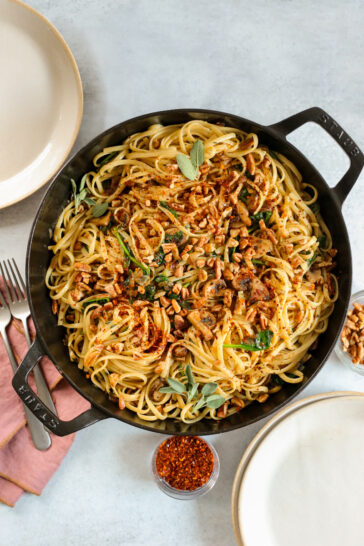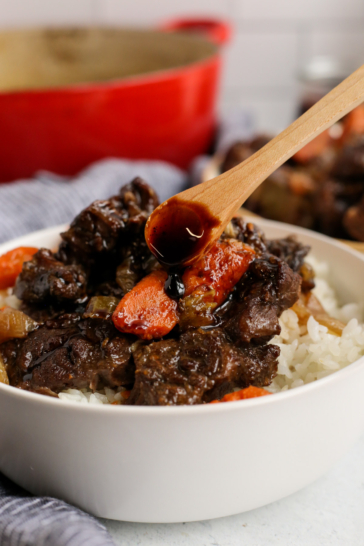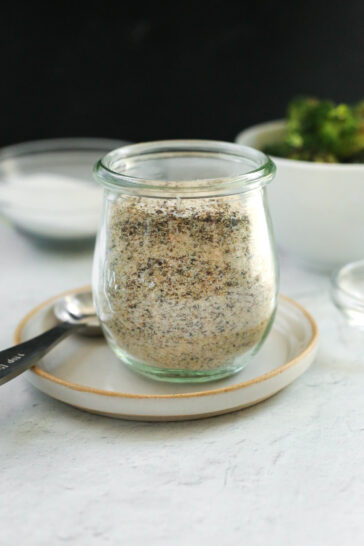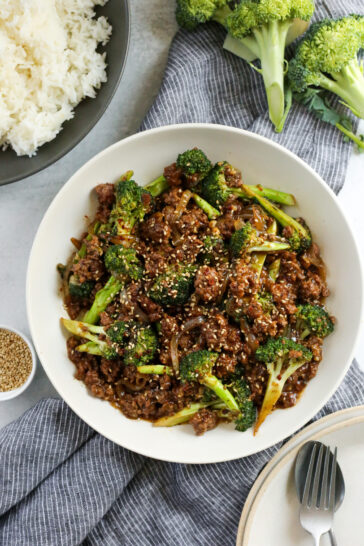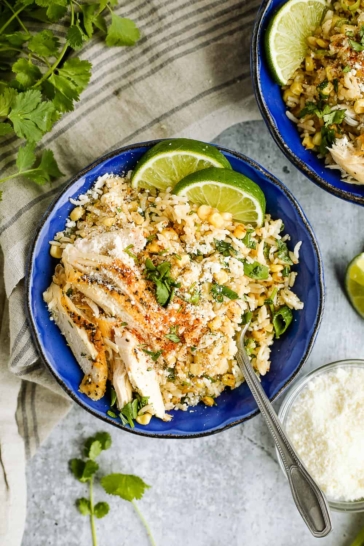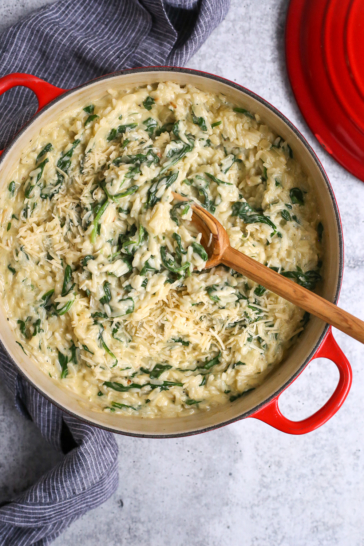If you’re experiencing higher levels of stress & anxiety, or if the current situation is exacerbating mental health challenges or triggering eating disorder behaviors, it can feel especially daunting to be at home with stockpiled foods and limited options. Learn more about the Gentle Nutrition principle of Intuitive Eating and how it can be applied during times of stress and anxiety.
I don’t know about you, but things are far from typical around here. While working from home is the norm for me, I realize this is the exception for most. I’m still working on adjusting to canceled events, postponed travel, and other disruptions to my routine as we settle in for some social distancing. The introvert in me is embracing this chance to lay low and rest more than usual, but my anxiety is rising due to the unknowns.
If you’re feeling this as well, I see you. I know how uncomfortable it can be to sacrifice some of the things you’ve worked hard on. Maybe you’re currently working on healing your relationship with food and your body, or maybe it feels like you just hit a huge snag when you were starting to hit your stride with it. Seeing posts about quarantines, working from home, closed gyms and all the rest can trigger some big feelings, even if you felt you were past the point of letting diet culture drive your reactions.
Here are five ways to start practicing gentle nutrition for this stressful time.
1. Be Kind, To Yourself and Others
First, know that you are doing the right thing by social distancing or following the recommendations for quarantines. It’s not ideal, it’s not what we want. But as we’ve learned, we all play a part in flattening the curve. Offer yourself this recognition and validation even if you feel tempted to act against it. Your selflessness is helping.
In the same vein, we can offer this same kindness and validation to others and help support them. However, if this feels overwhelming, you are always able to withdraw out of respect for your own personal boundaries. This is not selfish, nor is it being rude or unkind. If you feel it’s best to step away from conversations or distance yourself (virtually or digitally) from the news or other things, this is also an act of kindness for yourself. Don’t forget social distancing applies to social media, too! Unfollow accounts that feel triggering or whose messages are not aligned with what you need right now.
2. Remember the Big Picture
Just as we saw in this post about macro tracking, the body doesn’t keep a 24-hour clock tallying up grams of carbohydrates, fat, or protein. While it may seem like your eating pattern from a few days or a few weeks is detrimental to your overall health, remember that this is not the case. Our bodies are amazingly resilient and adaptable – your body CAN handle an eating pattern that differs from normal and come out the other side.
Normal eating comes in many flavors; there’s no one “right” or “wrong” way to do it. And in this case, your version of “normal” does not need to look like it has in the past.
This applies to more than gentle nutrition, too. When it comes to fitness, you may also feel distressed about being less active than usual or having limited opportunities to move the way you’d like to. Intuitive Eating also addresses this (look at Principle 9 and joyful movement). A few days or weeks away from your normal routine won’t drastically impact your health, nor will it completely derail your fitness. Most of us aren’t elite athletes with our livelihoods depending on physical performance. Try to look at the big picture and embrace an opportunity to rest and recover. It may be the way to go to treat your body well right now.
3. Invite Yourself to be More Flexible
You may prefer to follow a certain eating style or have your particular food preferences. But letting yourself be more flexible with good choices is a big piece of gentle nutrition and intuitive eating in general.
Flexibility in normal settings might look like adding more variety. In other posts about gentle nutrition and intuitive eating, you’ll see suggestions to increase variety, explore new foods, and experiment with flavors, cuisines, and cooking styles. However, being home-bound may drastically reduce your options or limit your ability to introduce variety. In this case, flexibility might look like working towards making peace with familiar foods or practicing some of the other principles of intuitive eating. Nutrition can still have a place, but it needs to take a backseat if thinking about it too much is adding more stress & anxiety.
4. Eat Regularly and Eat Enough
In the world of dieting, micromanaging a meal schedule or eating a set amount of food is the name of the game. With intuitive eating, that gets replaced with internal cues, such as reconnecting to hunger and fullness and choosing foods that are satisfying and filling. At some point, we can invite loose structure back in – meal planning from a place of self-care instead of restriction is one example of this.
Keeping a loose structure might look like planning regular meals or scheduling breaks for snacks. With our work and school routines far from normal, perhaps the timing of them needs to shift, but eating regularly can help maintain some sense of normalcy. Planning for meals every 4-5 hours, or snacking every 2-3 hours, will prevent you from forgetting to eat or unintentionally skipping meals. Likewise, it will also break up your day and give you ample opportunity to nourish your body consistently.
It’s OK if you notice your appetite is just a little “meh”. Or maybe the foods that normally satisfy you don’t have the same appeal. This isn’t your fault, nor your body’s. Anxiety is one of the things that will heighten appetite for some and stifle it for others. For myself, I notice my appetite is all but gone for most of the day, then comes roaring back when I settle into the couch for a Netflix binge. If I ate ONLY according to my appetite, I wouldn’t be able to get the energy or nutrition I need to help stabilize my mood (hanger, anyone?) and I’d wind up feeling worse. Sticking to a loose schedule reminds me to eat even in the absence of physical hunger.
Finally, eating enough is key. Often, we feel tempted to scale back or “eat less” in times like this (thank you, pesky diet culture for making this our first reaction). But restricting energy or nutrients is a burden on the body even if we don’t consciously register this additional strain. It might feel like you’re “overeating” but now is the time to trust your body. If your appetite is the same or increased, you are absolutely allowed to eat until you feel satisfied and safe. Remember, adequate energy is essential for keeping all body systems running as intended – including your immune system!
5. Reflect on How You’re Feeling
With more time at home, journaling or reflection exercises may be a helpful activity. It distracts your mind by giving you something to focus on and might yield some answers to drive your next decisions for gentle nutrition.
You can start by asking questions like:
- Which foods help me feel nourished, energized, or sustained?
- What do I enjoy about the flavor, texture, or temperature of these foods?
- Do I notice my body responding to these foods differently now that I feel more stressed?
With that last one, it’s alright if you feel some foods are tolerated differently than normal. When you’re under high stress or less active than usual, GI motility can be affected. This means your typical digestion may be thrown for a loop (as with seemingly everything else), contributing to symptoms like bloating or gas, heartburn, constipation, or generally feeling more discomfort in your gut. Know that this is a normal and natural response, and not anything you need to react to with extreme measures. Over-the-counter options for anti-gas or antacids are an option.
But there’s no need to immediately assign blame to the food. These signs are not always indicative of a food intolerance or a newly developed sensitivity (though they can be – as always, there are exceptions). Just as you try to practice kindness with yourself and others, extend that same compassionate approach to your body. It’s not trying to work against you, it’s simply trying to adjust to this new situation the same as the rest of us.
If you’re interested in reading more about Gentle Nutrition and Intuitive Eating, check out these posts from fellow non-diet dietitians:
- Principle 10: Honor Your Health with Gentle Nutrition by Evelyn Tribole
- How to Practice Gentle Nutrition in Intuitive Eating by Rachael Hartley at The Joy of Eating
- How to Embrace Gentle Nutrition by Alissa Rumsey
- Implementing Gentle Nutrition by Robyn at The Real Life RD
- Gentle Nutrition: Stop Dieting and Have a Healthy Relationship with Food by Erica Leon
Finally, remember that although things are changing, they will change again. You’ll have future opportunities to eat in ways that are more aligned with your values. For now (and always), you are allowed to eat because of boredom, stress, discomfort, or any other emotion. Emotional eating is not the problem here and neither is the food you have available.
No matter where you find yourself on your journey with gentle nutrition and intuitive eating, these tips can help you forge a more peaceful relationship with food no matter the setting you find yourself in. Know you’re not alone – many of us are in the same boat!
If you need space to share and connect, leave a comment. How has your approach to gentle nutrition and intuitive eating changed?

